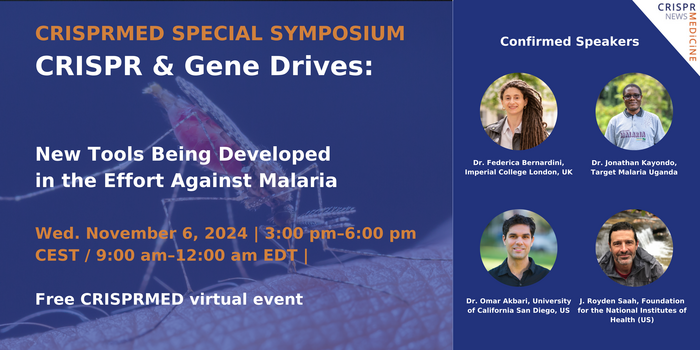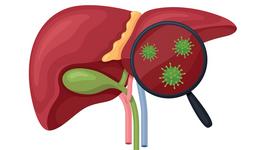CMN Weekly (25 October 2024) - Your Weekly CRISPR Medicine News
CMN Intelligence - The World’s Most Comprehensive Intelligence Platform for CRISPR-Genomic Medicine and Gene-Editing Clinical Development
Providing market intelligence, data infrastructure, analytics, and reporting services for the global gene-editing sector. Read more...
Top pick
- For the first time, a therapeutic strategy that combines T cell therapy with gene editing will be tested in a clinical trial. The therapeutic candidate in question has been developed under the supervision of Özcan Met PhD, who leads the cell therapy unit at the National Center for Cancer Immune Therapy in Denmark (CCIT-DK). To develop the therapy, T cells are isolated from patients, subjected to CRISPR-mediated knockout of the PD-1 checkpoint protein, and reinfused into patients to boost their ability to fight cancer cells. The trial, which was recently approved by the Danish Medicines Agency, will evaluate the new therapy for the treatment of metastatic melanoma in up to 10 adults with incurable disease. Read the full article (in Danish) here. For English, see our previous interview with Özcan Met shortly after the strategy was first published in Molecular Therapy: Oncolytics. You can hear Özcan Met speaking about this work at next year's CRISPR Medicine Conference (#CRISPRMED25)
Research
- In an article published this week in Journal of Experimental & Clinical Cancer Research, researchers in Italy and Australia report a new strategy to treat the deadly childhood cancer neuroblastoma (NB) based on a combination of CRISPR-mediated gene silencing and a histone deacetylase inhibitor known as entinostat. They found that silencing the endoplasmic reticulum aminopeptidase 1 (ERAP1) gene in combination with entinostat increased the immunogenicity of NB cells, making them responsive to PD-1 therapy. The team observed that while neither strategy alone was effective, a triple combination of ERAP1 silencing + entinostat + PD-1 blockade significantly improved survival rates without toxicity in a mouse model of NB. Read the full article in Journal of Experimental & Clinical Cancer Research here.
- In an article published in ACS Nano this week, researchers in China and US demonstrate that in utero intracerebroventricular (ICV) injection of densely PEGylated lipid nanoparticles (ADP-LNPs) containing an acid-degradable PEG-lipid can safely and effectively deliver mRNA for gene-editing enzymes to the foetal mouse brain, resulting in successful transfection and editing of brain cells. They show that ADP-LNPs containing Cre mRNA could transfect 30% of the foetal brain cells in Ai9 mice without detectable adverse effects on foetal development and post-natal growth. They also report that ADP-LNPs efficiently transfected neural stem and progenitor cells in Ai9 mice with Cre mRNA, which subsequently proliferated and caused over 40% of the cortical neurons and 60% of the hippocampal neurons to be edited in treated mice 10 weeks after birth. Similarly promising findings were also made in a mouse model of Angelman syndrome.
- Researchers in China present a dual amplification CRISPR miRNA assay developed by combining enzyme-free HCR with single-particle analysis. Attomolar detection limits, excellent selectivity, and practicability were achieved by applying this method. They propose that the new assay helps to address challenges associated with current miRNA detection methods that require PCR amplification, including high costs, non-specific amplification, and interference from primer residues in pre-amplification strategies. Their findings were published this week in Chemical Communications.
Industry
- Yesterday, Intellia Therapeutics released new positive results from the ongoing Phase 2 trial of NTLA-2002 in hereditary angioedema (HAE) that further support the therapeutic candidate as a functional cure. The data were published in the New England Journal of Medicine and will be presented this Saturday at the American College of Allergy, Asthma & Immunology meeting. NTLA-2002 is an in vivo CRISPR-editing therapeutic candidate designed to knock out the target gene kallikrein B1 (KLKB1) in hepatocytes. This gene encodes prekallikrein, a precursor of plasma kallikrein, thus its knockout permanently reduces plasma kallikrein activity and halts the production of bradykinin to prevent the painful inflammatory attacks seen in HAE. See the official press release for further details.
- Editas Medicine and Genevant Sciences announced this week that they will collaborate to develop novel mRNA-LNP gene-editing therapeutics. The non-exclusive license agreement will combine Editas' CRISPR Cas12a genome-editing systems with Genevant’s proprietary LNP technology in the development of in vivo gene-editing medicines directed to two undisclosed targets in Editas’ upregulation strategy. See the official press release for further details.
- Poseida Therapeutics is scheduled to present new pre-clinical data that supports non-viral gene editing with its candidate P-KLKB1-101 for the treatment of HAE. P-KLKB1-101 is a liver-directed genetic medicine that uses Poseida's Cas-CLOVER™ site-specific gene-editing system and the new data demonstrate high-fidelity KLKB1 gene editing for the targeted correction of HAE, the ability for controlled dose response, favourable tolerability and liver editing within the predicted therapeutic range. For more details, see the official press release here.
- HuidaGene Therapeutics announced this week that it has appointed TJ Cradick, PhD as Chief Technology Officer to lead the company's delivery science and genome-editing innovations. Dr. Cradick is a pioneer in genome editing and has contributed to notable advances within CRISPR, TALEN, and ZFN technologies. As CSO at Excision BioTherapeutics, he developed the first in vivo CRISPR treatment targeting latent HIV reservoirs. As Head of Genome Editing at CRISPR Therapeutics, he contributed to the approval of the groundbreaking therapy CasgevyTM, the first-ever approved CRISPR-based treatment. Read more in HuidaGene's press release here.
- AvenCell Therapeutics announced in a press release published this week that it has raised $112 million in a Series B funding round led by Novo Holdings. The company is advancing its proprietary Universal Switchable CAR-T cell therapy platform to develop new treatments for blood cancers and autoimmune diseases. In March of this year, AvenCell reported that the first patient had been dosed in a Phase 1A clinical trial of AVC-201, the company's lead clinical allogeneic cell therapy programme. Read more about that in a previous clinical trial update here.
- Moonwalk Biosciences announced this week that it will present new epigenetic data at ObesityWeek 2024 and The Liver Meeting 2024, both taking place next month. According to a press release, the company will present new data highlighting its epigenetic capabilities in identifying new therapeutic targets for metabolic diseases and liver disorders using its proprietary EpiRead™ and EpiWrite™ platforms.
- Arbor Biotechnologies will highlight new pre-clinical data from its pipeline programmes that support the knock-in applicability of Type V Nucleases at several upcoming/ongoing medical and scientific meetings; American Society of Nephrology (ASN) 2024 Kidney Week Meeting (ongoing), 31st Annual European Society of Gene and Cell Therapy (ESGCT, ongoing), and ALS One 7th Annual ALS Research Symposium, November 13-15, Virtual. See the press release for further details.

CRISPRMED Special Virtual Symposium
CRISPR & Gene Drives: New Tools Being Developed in the Effort Against Malaria
Given the global spread of vector-borne disease (VBD) and the implications this could have on public health, CRISPR Medicine News is hosting this virtual event to raise awareness about VBD with a special focus on malaria. During the event, four leading scientists will provide an up-to-date overview on the status of VBD and discuss how genetic control strategies based on gene drives and CRISPR can and are being used to develop solutions. The event will include four presentations as well as a panel discussion.
This special symposium is co-organised with Dr. Vincenzo Di Donato (ZeClinics and TReND in Africa), Davis Eban (University of Lagos and I-Gene Life Science Foundation), and Dr. Thomas Auer (University of Fribourg, Switzerland and TReND in Africa).
See more details and sign up here!
News from ESGCT 2024
- Prime Medicine presented in vivo proof-of-concept data highlighting pre-clinical advances in its Wilson’s Disease programme and the broad potential of its universal liver-targeted LNP. The data was presented through an oral as well as a poster presentation. Among the highlights were that delivery of prime editors with the universal liver-targeted LNP was well tolerated, with no safety concerns or detectable off-target edits observed across multiple pre-clinical studies. The company also reported that it is on track to initiate IND-enabling activities for its Wilson’s Disease programme in 4Q 2024, with IND and/or CTA filing expected in the first half of 2026. See here for further details.
- Epicrispr Biotechnologies presented new data on its hypercompact platform for epigenetic editing, in addition to IND-enabling data for its investigational therapy for facioscapulohumeral muscular dystrophy. Epicrispr plans to initiate clinical trials of lead candidate EPI-321 in early 2025. See here for further details.
Reviews
- Nanomedicine for cancer patient-centered care. The authors of this review survey the key approaches through which nanosystems can meet the needs for personalised diagnostics and therapy in cancer patients. Focus is given to organ-on chip technology and cutting-edge tools, such as CRISPR/Cas9 genome editing. An update is provided on the nanopharmaceuticals approved and marketed for cancer therapy and those currently undergoing clinical trials. Finally, the authors discuss emerging avenues in the field and challenges to be overcome for the transfer of nano-based precision oncology into clinical daily life.
- The potential of HBV cure: an overview of CRISPR-mediated HBV gene disruption. The authors review recent literature describing the tools employed in designing gRNAs targeting Hepatitis B virus (HBV) genomes, the vehicles used for expressing and delivering CRISPR-Cas9 components, the models used for evaluating CRISPR-mediated HBV gene disruption, the methods used for assessing antiviral and off-target effects induced by CRISPR-Cas9-mediated HBV gene disruption, and the prospects of future directions and challenges in leveraging this HBV gene-editing approach, to advance the HBV treatment toward a clinical cure.
- CRISPR/Cas9 technology for advancements in cancer immunotherapy: from uncovering regulatory mechanisms to therapeutic applications. This systematic review explores CRISPR-Cas9's applications in tumour immunotherapy, examining its role in immune system modulation, checkpoint targeting, and antigen presentation. The authors highlight pre-clinical studies involving CRISPR-Cas9 in animal models and various delivery systems and evaluate the efficacy and safety of CRISPR-Cas9 technology in tumour immunotherapy. Finally, potential synergistic approaches for combining CRISPR-Cas9 knockdown with other immunotherapies are presented.
Perspectives
- Impact of CRISPR in cancer drug discovery. This perspective in Science by Jason Moffat (The Hospital for Sick Children, Toronto), Alexis C. Komor (University of California San Diego), and Lawrence Lum (University of Texas Southwestern Medical Center) looks at how precision gene editing has and is enabling massively parallel identification of cancer-promoting genes.
- Intellia data spark debate about CRISPR drug’s potential. Newly published data (yesterday) show that Intellia's NTLA-2002 therapeutic candidate for hereditary angioedema reduced the rate of swelling attacks in 27 Phase 2 trial participants, with either a 75% or 77% reduction in attacks in the 16-week period after receiving therapy, depending on the dose received. Yet, the company's stocks dropped 20% in early trading yesterday. This piece in BioPharma Dive summarises the latest clinical data and discusses the possible reasons for the dip in share price.
News from CRISPR Medicine News
- On Monday, we published an interview with Erin Kavanagh, a PhD candidate at Johns Hopkins University School of Medicine and first author on a recent article reporting a new type of engineered nanoparticle capable of delivering genetic material to the mouse lung and human lung cells. Read that interview here.
- On Tuesday, we published an interview with Moligo Technologies' CEO Cosimo Ducani. The Karolinksa Institute spin-out is pioneering a unique enzymatic approach to DNA synthesis that overcomes the limitations of chemical & fermentation methods. Moligo’s approach is PCR-free & unrivalled in purity & sequence quality. Its ability to provide long, ultrapure, complex DNA at industrial scale also addresses the urgency for virus-free therapies as highlighted by the IGI & other leading scientists. Read the sponsored interview here.
To get more CRISPR Medicine News delivered to your inbox, sign up to the free weekly CMN Newsletter here.
Tags
ArticleMissing linksNewsCMN WeeklyArbor BiotechnologiesAvenCell TherapeuticsEditas Medicine, Inc.Epicrispr BiotechnologiesHuidaGene TherapeuticsIntellia Therapeutics, Inc.Moonwalk BiosciencesPoseida TherapeuticsPrime Medicine
CLINICAL TRIALS
Sponsors:
Base Therapeutics (Shanghai) Co., Ltd.
Sponsors:
Base Therapeutics (Shanghai) Co., Ltd.







